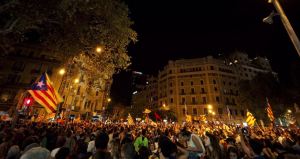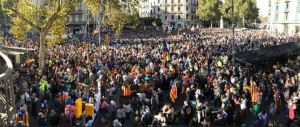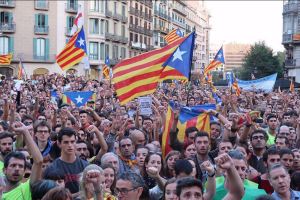nsnbc : Spanish national police have cracked down on Catalonia, stormed ministries and buildings of the Catalonian regional government and arrested politicians in an attempt to stop the region’s independence referendum. The move led to mass protests and a face off between protesters and national police.
Span’s Guarda Civil which is under the command of the Spanish Interior Ministry in Madrid, is searching for evidence regarding the planned independence referendum scheduled for October 1. The Constitutional Court of Spain has earlier declared the referendum illegal.
In the early hours of morning armed officers stormed a number of Catalan ministries including the Economy Department, the Foreign Affairs Department and the Social Affairs Department. Police also arrested a number of elected Catalonian officials, reportedly including Catalonia’s Deputy Prime Minister Josep Maria Jové. On Tuesday police searched for election material including ballot boxes, voting papers and campaign leaflets. Police was also raiding private courier companies in the process. The arrests came after mayors of Catalan towns who support the referendum were brought in for questioning by state prosecutors.
The crackdown and the arrests prompted pro-independence protesters, as well as anti-fascist protesters who may or may not be for independence but who oppose what is described as Madrid’s overt return to fascist methods, to rally outside regional ministries in support of the Catalan government.
Carles Puigdemont, the president of the Catalonian government who spoke Thursday morning, said the Spanish government had “de facto suspended” home rule in the province.
The government of the autonomous region – the Generalitat – had called the referendum after pro-independence parties were able to form an administration following elections in 2015. Catalonian National Assembly President Jordi Sànchez, on Wednesday morning, called for “peaceful resistance” to the police operation. “The time has come. We resist peacefully. We come out to defend our institutions with non-violence,” he said in a post on social media.
The Spanish National Assembly in Madrid, on Wednesday rejected a motion to support the Spanish government’s heavy-handed response to the referendum by 166 votes against to 158 in favor, after the centre-left opposition party PSOE teamed up with left-wingers Podemos and smaller separatist parties in the parliament. After news of the raids broke on Wednesday, separatist political parties, as well as Podemos, cancelled all their planned political events for the rest of the day.
“It is unacceptable for there to be political prisoners in a European democracy. The Partido Popular leads us to an authoritarian regression that cannot be tolerated,” a spokesperson for Podemos said on social media. Right-wing parties however endorsed the police operation. Ciudadanos leader Albert Rivera said he supported the raids because the Catalan government had “skipped the law and are trampling our rights”. A spokesperson for the ruling Partido Popular said that “the rule of law is stronger than those outside the law”.
Catalonia’s provincial government is a broad coalition of separatist parties from the left and right, ranging from the left-wing Republican Left of Catalonia to the centre-right Democratic Convergence of Catalonia.
Catalonia with its capital Barcelona generate about 20 percent of Spain’s GDP. Some 7.5 million people live in Catalonia. many of them, if not most, would primarily describe themselves as Catalan, then as Spanish citizens.
Catalonia has self-governance in certain areas such as police, health, education but key areas such as foreign affairs, taxes as well as infrastructure are in the hands of the central government in Madrid. Catalonia has long complained that Madrid is using a disproportionate amount of funds on development in other regions, especially Madrid, while Catalonia is being neglected. Basques have similar grievances.
International law, standard and precedence is as multifaceted as the debate in Spain and Catalonia. The UN General Assembly, in its 1973 Declaration of Principles, stressed that a State’s right to territorial integrity and people’s right to self-determination are equally valid, but that the one cannot have primacy above the other when it violates the other. This would mean that Catalonians have the right to self-determination but are obliged to achieve it legally within the Spanish constitutional framework. Conversely this – arguably – also means that a central government must if necessary adopt constitutional change that would make a secession legal and specify how it can be achieved.
Spanish and international precedent is a mixed basket. The central government in Madrid has for decades cracked down on Catalonian and especially Basque separatist movements, parties, activists and politicians. Crack downs have often been brutal and led to decades of armed struggle between the central government and the Basque ETA. A recent referendum in Scottland was held peacefully, but there were critics on both sides, making it probable that the issue of independence from the UK may be picked up again depending in part on Britain’s BREXIT from the EU.
In Crimea the referendum was held without approval from the central Ukrainian government in Kiev. The central government in Kiev would, conversely, not have agreed to allow a secession within the constitutional framework or allowed constitutional reform. The referendum was held with strong Russian support and the referendum as well as Crimea’s accession into the Russian Federation are internationally disputed.
On September 25 the Kurdistan Autonomous Region (KAR) of Iraq has scheduled an independence referendum. The central Shia-dominated government in Baghdad declares the referendum unconstitutional. Leading Iranian, Turkish and Iraqi politicians warned that the referendum would lead to war. The US and most EU countries find the timing bad and urge to wait until ISIS has been defeated. Russia supports the right to hold the referendum. Both Spanish and international precedent shows, in other words, that there is a potential for disastrous developments in Spain and Catalonia.
CH/L – nsnbc 21.09.2017
Source Article from https://nsnbc.me/2017/09/21/spanish-national-police-cracks-down-on-catalonian-independence-referendum-arrests-politicians/
 RSS Feed
RSS Feed















 September 21st, 2017
September 21st, 2017  Awake Goy
Awake Goy 













 Posted in
Posted in  Tags:
Tags: 













